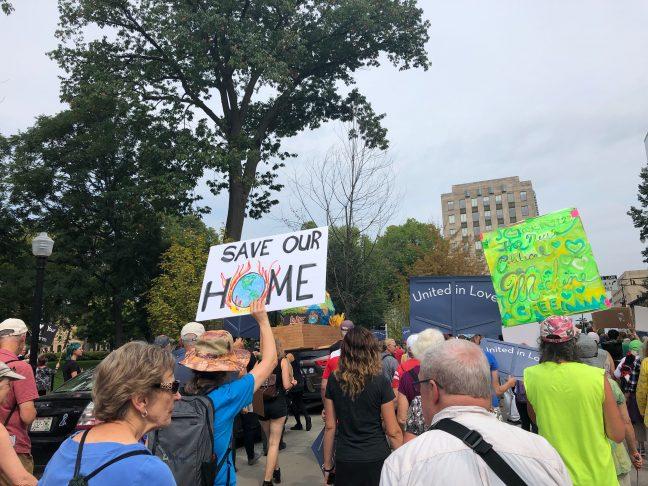Organizations continue the fight against climate change and advocate for environmental action in Wisconsin, despite a lack of assistance at the federal level.
A professor at the University of Wisconsin La Follette School of Public Affairs since 2007, Gregory Nemet works on energy and climate change policy to help stimulate innovation in low-carbon energy technologies. Nemet said the current state of the environment is fragile.
“We depend on [the environment] for our daily lives for clean air, clean water and food,” Nemet said. “We don’t want to get into a situation where it becomes less reliable for the things we need.”
Nemet said carbon dioxide emissions are up by about 50% since 1970 and have been fairly flat over the last 15 years, but stressed the importance of reducing emissions in the next several decades.
Nemet said he was motivated to work to combat climate change after he noticed the level of effort put forward to develop new technologies and software for pharmaceutical companies.
“There wasn’t the same level of effort going into the environment, specifically the energy sector, yet that was so important to improving the environment,” Nemet said. “That’s when I decided to make a change and start working on developing new ways of using and producing energies.”
Michael Pinkert, the chapter leader for Citizens’ Climate Lobby in Madison, said the current state of the environment in Madison is an opportunity to defend the city.
Pinkert said Madison is already confronting the effects of climate change through increased flooding which will cause an increased cost of living in the city.
“We’re already seeing that climate change is bringing huge costs to Madison today,” Pinkert said. “Climate change is not some distant thing that is affecting people far away. It’s affecting our lives now.”
Nemet said he has not seen sufficient environmental policy changes at the state or federal level over the last few years and despite climate change targets that were set, there are no substantive pieces of legislation to ensure these targets are met.
According to the Bipartisan Policy Center, the Environmental Protection Agency (EPA) proposed the Clean Power Plan under the Obama Administration in 2014, an executive order to regulate carbon dioxide emissions from existing power plants. Nemet said this policy was subject to multiple legal battles, and the Trump Administration no longer defends the policy regardless.
“[Leaders] should agree on a bipartisan solution to climate change,” Pinkert said. “If it’s not bipartisan, it’s not going to last. You see that with regulations from Obama. [Policies] can be just as easily reversed with the next president, or if Republicans have some solution that Democrats don’t agree with.”
Nemet said polls indicate roughly 60% to 70% of Americans agree on the need for government to address climate change.
Nemet said the discussion surrounding climate legislation has centered around the financial interests of large companies for too long, legislation which has historically proven effective in their ability to stop climate change policies.
“There’s so much evidence now that large oil companies and coal companies hired the same people who were very active in stopping tobacco legislation for a long time,” Nemet said. “It’s the same people, the same strategies, that have been employed for climate change over the last 30 years.
The Citizens’ Climate Lobby is an international environmental group that empowers citizens to work together on climate change solutions. They are building Congressional support for a national, bipartisan solution to climate change.
The Citizens’ Climate Lobby works with organizations like Students for Carbon Dividends, a bipartisan, college student-led organization that encourages carbon dividends. Pinkert said the group is led by 50 young Republicans and 50 young Democrats.
“Any issue that becomes politicized becomes almost very difficult to make progress on,” Pinkert said. “Citizens’ Climate Lobby’s core approach is to be nonpartisan, to try to make climate into a bridge issue rather than a wedge issue.”
Pinkert said the Citizens’ Climate Lobby also received endorsements from the city of Middleton for their proposed climate change bill. They continued to lobby with local grassroots efforts to talk with congressional leaders, including Rep. Mark Pocan, District 2 D-WI; Sen. Tammy Baldwin, D-WI and Sen. Ron Johnson, R-WI.
Nemet said he is optimistic about the future of our environment. According to Nemet, the Clean Air Act reduced sulfur dioxide emissions, nitrogen oxide emissions and dramatically scaled back the emission let into the atmosphere over the last 50 years.
“[Climate change] is an immense issue,” Pinkert said. “One person doing something isn’t going to work but if a lot of people start talking about it and start thinking of solutions, we can get a lot further than we are now and bring hope to our next generations.”


